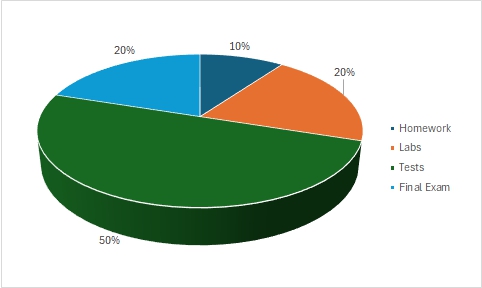|
Who takes
Honor's Physics? Juniors or seniors that excel in
math and science and who are interested in learning the physical
principles that explain everyday occurrences. Officially,
students must have satisfactorily completed chemistry and satisfactorily
completed, or be currently enrolled in, advanced algebra. Once
these requirements are met, students are selected to be in Honor's
Physics based on receiving an A or B in Honors Chemistry or an A in
Chemistry, the studentís level of success in previous math
courses, teacher recommendation, and test scores.
What topics
are covered in Honor's Physics?
In general, Physics is the study of matter and energy. In
non-technical terms, students will study the motion and movement of
different stuff. More specifically, we cover:
- Units and Problem solving
- Kinematics: Description of motion
- Motions in Two Dimensions
- Force and Motion
- Work and Energy
- Momentum and Collisions
- Circular Motion and Gravitation
- Rotational Motion and Equilibrium
- Solids and Fluids
- Temperature, Heat, and
Thermodynamics
- Vibrations and Waves
- Sound
- Light and Electromagnetic waves
- Color and Thin Film Interference
- Diffraction, Polarization,
Reflection and Refraction of Light
- Mirrors and Lenses
- Electrical Charge, Forces, and
Fields
- Electric Potential, Energy, and
Capacitance
- Electric Current
- Electric Circuit Basics
- Magnetism
Students
will be asked to work in groups and individually to test certain
physics principles. During
the investigations, students will utilize high-level math skills and
computers to analyze data.
Back
to Top
What is the
difference between Honors and Regular Physics? Honors
Physics covers more topics than regular physics, therefore we must
move at a faster pace. To do this, students are expected to
work hard at using their problem solving skills to successfully
complete assignments. In addition to more topics, we discuss
some elements of physics in more detail than the regular physics
class. This higher detail often involves more algebraic
manipulation and computation, requiring students to already have a
comfortable grasp of algebra and algebraic functions. Finally,
because it is a honors level course, semester grades in Honors
Physics are considered weighted grades.
Back
to Top
How are grades
determined? All assignments
are given point values based on the quantity and difficulty of the
work. Each assignment can be categorized into one of the
following types of assignments. Each category is then weighted
according to the chart below to determine the final grade:

| Category |
Value |
| Homework |
10% |
| Labs/Projects |
20% |
| Tests /Quizzes |
50% |
| Semester Exam |
20% |
Because of this weighting system, it
can be difficult for students to keep track of their own
grades. To minimize this effect, and in an attempt to keep
both students and parents informed of the student's progress, I post
the current grades online at least once a week.
Back
to Top
State Standards
There is a growing need to insure that students are meeting state
learning standards. The current Honors Physics curriculum has
been aligned with the Illinois State Learning Standards. If
you would like, you can download this file*,
which shows how this course meets these standards.
*Linked files are available in PDF
format. Get the free Adobe PDF Reader here.
|